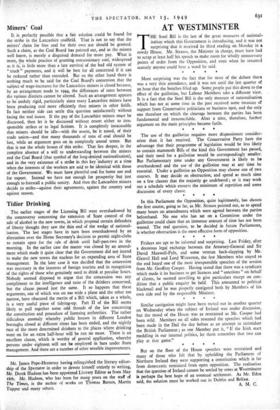AT WESTMINSTER
THE Steel Bill is the last of the great measures of national- isation which this Government is introducing, and it was not surprising that it received its third reading on Monday in a rowdy House. Mr. Strauss, the Minister in charge, must have had to scrap at least half his speech to make room for wholly unnecessary points of order from the Opposition, and even when he resumed scarcely anyone could hear a word he said.
More surprising was the fact that for most of the debate there was a very thin attendance, and it was not Until the last quarter of an hour that the benches filled up. Some people put this down to the effect of the guillotine, but Labour Members take a different view. It is a fact that the Steel Bill is the only measure of nationalisation which has not at some time in the past received some measure of support from Conservative politicians or business men, and the only one therefore on which the cleavage between the parties has been fundamental and irreconcilable. After a time, therefore, further argument on the main principles became futile.
a * * * The use of the guillotine requires more dispassionate consider- ation than it has received. The Conservative Party have the advantage that their programme of legislation would be less likely to contain mammoth Bills of the kind this Government has passed, and their need for a guillotine would be correspondingly smaller. But Parliamentary time under any Government is likely to be overburdened and the use of the guillotine may at any time be essential. Under a guillotine an Opposition may choose one of two courses. It may decide on obstruction, and spend so much time on a few clauses that the majority go undebated ; or it may work out a schedule which ensures the minimum of repetition and some discussion of every clause. * * * * In this Parliament the Opposition, quite legitimately, has chosen the first course, going so far, as Mr. Strauss pointed out, as to spend many hours on amendments which were agreed between the parties beforehand. No one who has sat on a Committee under the guillotine could claim that an immense amount of time has not been wasted. The real question, to be decided in future Parliaments, is whether obstruction is the most effective form of opposition.
* * * * Fridays are apt to be informal and surprising. Last Friday, after a decorous legal exchange between the Attorney-General and Sir David Maxwell-Fyfe, and some veteran back-slapping by Mr. Glenvil Hall and Lord Winterton, the few Members who stayed to the end heard one of the most irresponsible speeches of the session from Mr. Geoffrey Cooper. Having stated that there was a syndicate which made it its business to get licences and " sanctions " on behalf of clients, he seemed unwilling to give particulars except on con- dition that a public enquiry be held. This amounted to political blackmail and he was properly castigated both by Members of his own side and by the responsible Minister.
* a a Similar castigation might have been meted out in another quarter on Wednesday when the subject of Ireland was under discussion, but the mood of the House was as restrained as Mr. Cooper had been wild. Members on all sides resented the speeches which had been made in the Dail the day before as an attempt to intimidate the British Parliament ; as one Member put it, "If the Irish start meddling in our internal politics, let them remember that two can play at that game."
* * a * But on the floor of the House speeches were restrained- and many of those who felt that by upholding the Parliament of Northern Ireland they were supporting a constitution which is far from democratic restrained from open opposition. The realisation that the question of Ireland cannot be settled by votes at Westminster is perhaps the best hope of an eventual settlement. As Mr. Eden said, the solution must be worked out in Dublin and Belfast.






































 Previous page
Previous page